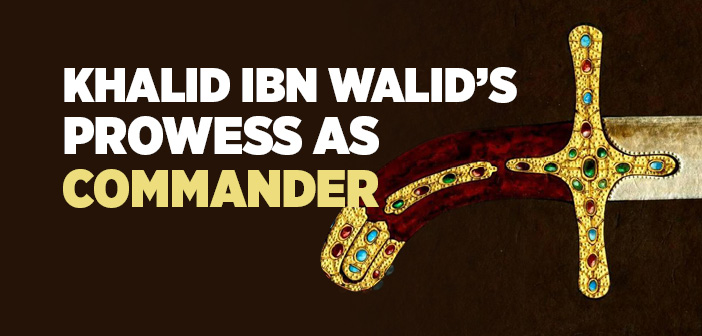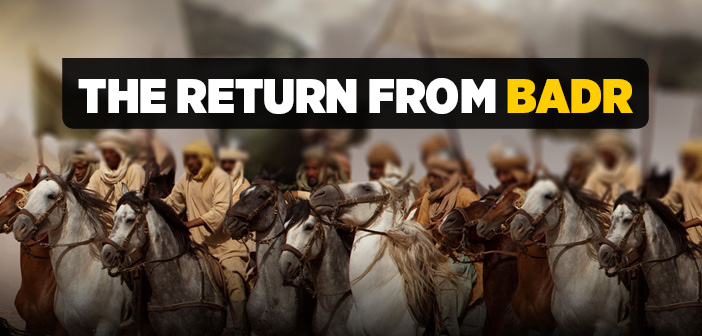Who is khalid ibn walid? Who is commander khalid ibn walid?
Khalid ibn Walid -Allah be well-pleased with him- managed the war with exceptional skill until sunset when both forces retreated into their camps with the setting dark. In the dark of night, he then completely changed the setup of the Muslim army. He switched the right and left flanks around, placed the soldiers of the forefront at the back, and moved those at the back to the very front line. Come morning, the enemy was dumbfounded; seeing completely fresh faces in front of them, they hesitated, thinking the Muslim army had received reinforcement overnight. Khalid ibn Walid -Allah be well-pleased with him-, the sword of Allah, was sure to pounce on this opportunity of having an undecided enemy in front of him. He launched a massive onslaught and the enemy, not expecting such a forceful offensive, could not endure long against the avalanche of iman that showed ominous signs of sweeping them away. They began showing signs of disarray and, as a safety measure, were ultimately forced to retreat.
Khalid ibn Walid -Allah be well-pleased with him-, who had nine swords broken in his hand that day,[1] made the most of that opportunity, too, and, without making it obvious to the enemy, commanded the retreat of the Muslim forces. A second testimony of his military genius, this maneuver meant that both forces had withdrawn without being able to claim victory. Khalid -Allah be well-pleased with him- managed to bring the Muslim army home to Medina without many casualties. The number of martyrs in a battle that spanned across seven days was only fourteen. Enemy casualties, on the other hand, were more. The Muslim army had even managed to bring some spoils with them. (Waqidi, II, 764, 768; Ibn Saad , III, 407)
The Blessed Prophet ordered the Believers in Medina ‘…to gather and welcome their homecoming brothers’, upon which the entire Muslims of Medina, joined by the Noble Prophet -upon him blessings and peace- riding his mount, braved the heat and gathered to meet the mujahidun. There was a crowd of children following the Blessed Prophet -upon him blessings and peace- . Seeing them, he commanded the Believers to take the children on the front of their saddles and give Jafar’s son Abdullah to him. Abdullah rode on the mount of the Blessed Prophet -upon him blessings and peace-, in front of him on the saddle. (Ahmad, V, 299; Ibn Kathir, al-Bidayah, IV, 244)
The Blessed Prophet -upon him blessings and peace- praised Khalid’s success; and to those in Medina who, for having no insight into the matter were accusing the returning soldiers with taking flight from the battlefield, he stated:
“They are not of those who flee from fighting in the way of Allah…rather they are those who retreat and attack, again and again!’ (Ibn Hisham, III, 438; Waqidi, II, 765)
Indeed, the Battle of Muta saw a small unit intimidate a major force of tremendous size, as if to actualize the truth revealed by the Almighty:
“How often has a small party vanquished a numerous host by Allah’s permission, and Allah is with the patient.” (al-Baqara, 249)
The Battle of Muta, where three-thousand Believers managed to avert a two-hundred-thousand manned force, marks first heated conflict with Christians, the People of the Book.
Asma bint Umays, the wife of Jafar -Allah be well-pleased with him-, recounts:
“The Messenger of Allah came to us when Jafar and his friends were martyred. That day, I had tanned forty pieces of pelt. After having prepared my bread dough, I washed the faces of my children, combed and oiled their hairs.
‘Where are your children, Asma?’ asked the Messenger of Allah. When I called them, the Messenger of Allah affectionately hugged and kissed them, embracing them all. In the meanwhile he had begun to shed tears.
‘May my parents be sacrificed for you, Messenger of Allah; why are you crying? Why are you treating my children the way you treat orphans? Or is it that you received bad news from Jafar and his friends?’ I asked him.
‘Yes’, replied he. ‘They were martyred today…’
‘Oh my…my Jafar’, I exclaimed and begun to wail.
The Messenger of Allah then told his daughter Fatimah to prepare food for ‘…Jafar’s family, for they are preoccupied with what has befallen them today!’
Food was brought to our house for three days; three days throughout which the Messenger of Allah did not visit us to give us sometime on our own. He then came and said to us, ‘Cry over my brother no more! From today onwards, I will look after his children!’”
Abdullah, Jafar’s -Allah be well-pleased with him- son, says:
“The Messenger of Allah gently took us to his home, like we were baby birds, and then sent for a barber. The barber came and gave us a haircut. The Messenger of Allah then lifted his hands and prayed, ‘O my Lord! Be a successor to Jafar’s family with goodness! Grant Abdullah’s hand prosperity in trade!’ He repeated the prayer three times.
I explained this to my mother when she came. She was overly happy. The Messenger of Allah said to her, ‘Do not worry about the livelihood of these children! I am their benefactor both Here and in the Hereafter!’ (Ahmad, I, 204-205; Abu Dawud, Tarajjul, 13/4192; Ibn Hisham, III, 436; Waqidi, II, 766; Ibn Saad , IV, 37)
Abdullah ibn Jafar -Allah be well-pleased with him- pleasantly reminisces how affectionate the Blessed Prophet -upon him blessings and peace- was towards them:
“I remember well. As Qusam, Ubaydullah, who are the sons of Abbas -Allah be well-pleased with him-, and I were playing in the street one day, the Messenger of Allah -upon him blessings and peace- turned up next to us on a mount.
‘Lift him to me’, he said to those around, pointing at me.
‘And him, too’, he then said in a similar tone, this time pointing at Qusam.
Even though Abbas -Allah be well-pleased with him-, the Prophet’s -upon him blessings and peace- uncle, had a greater fondness towards Ubaydullah than Qusam, the Messenger of Allah felt no qualm in taking Qusam onto his saddle. He then caressed Qusam’s head three times, praying each time:
‘O my Lord! Take care of Jafar’s children!’”[2] (Ahmad, I, 205; Hakim, III, 655/6411)
[1] Khalid ibn Walid -Allah be well-pleased with him- avows, “By Allah, nine swords broke in my hand on the Day of Muta. Only a Yemen made, wide-edged sword endured.” (Bukhari, Maghazi, 44)
[2] One of the narrators of the hadith says, “I asked Abdullah ibn Jafar ‘What happened to Qusam later?’ ‘He was martyred’, he said. I thereupon said, ‘Allah and His Messenger know best’. ‘Indeed’, replied he.” (Hakim, III, 655/6411)
Source: Osman Nuri Topbaş, The Prophet Muhammed Mustafa the Elect II, Erkam Publications





